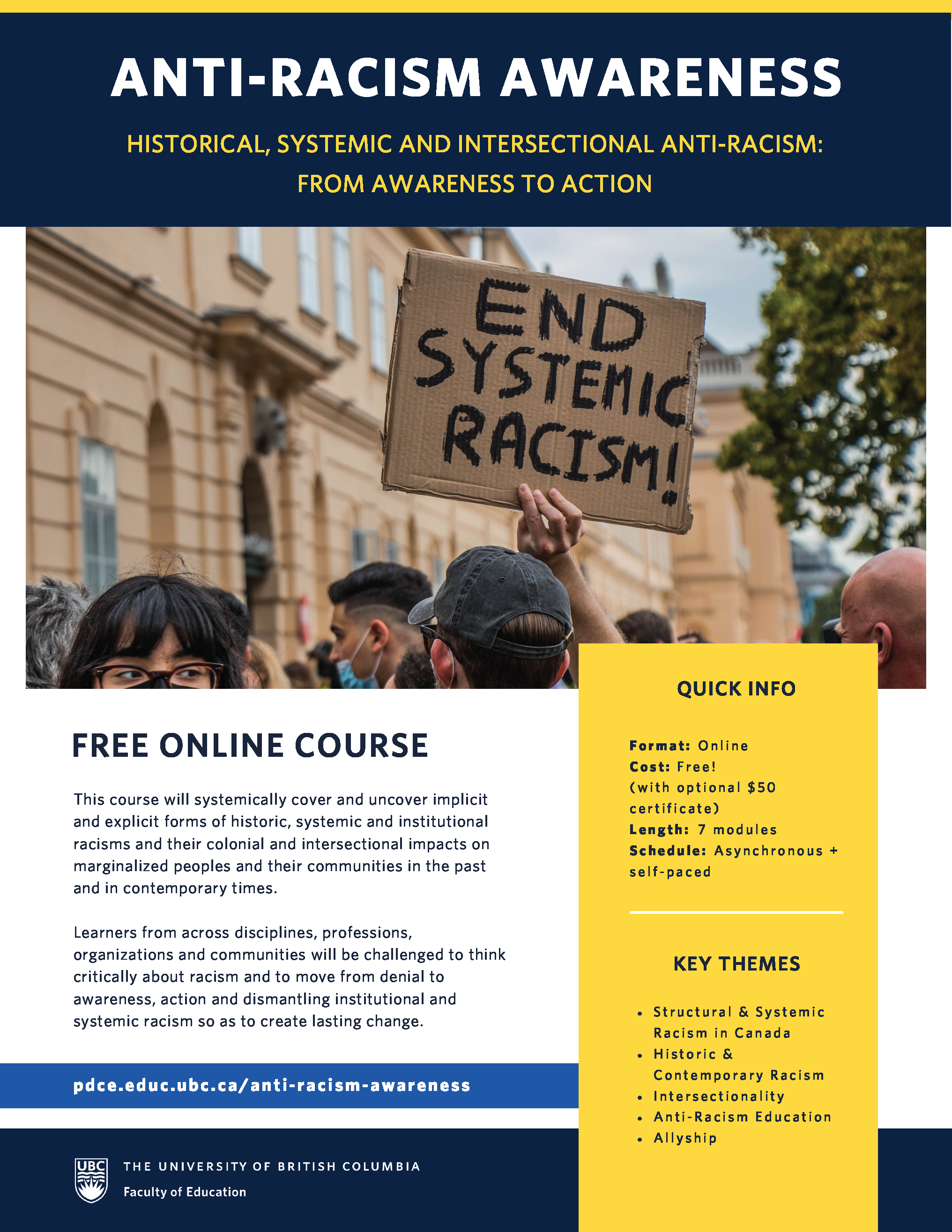Historical, Systemic and Intersectional Anti-racism: From Awareness to Action

This course will systemically cover and uncover implicit and explicit forms of historic, systemic and institutional racisms and their colonial and intersectional impacts on marginalized peoples and their communities in the past and in contemporary times.
Participants will gain a deep understanding of the hegemony of racism and how it is embedded and experienced in every day interactions and relationships in all facets of society and its institutions.
Learners from across disciplines, professions, organizations and communities will be challenged to think critically about racism and to move from denial to awareness, action and dismantling institutional and systemic racism so as to create lasting change.
Participation in this online course is FREE!
An optional certificate of completion is $50. Please select this option when you register as it cannot be selected once you finish the course.
Modules
You will be introduced to various terminologies related to race and racism, racial constructions and why they matter. You will have activities to help you build awareness on how race, racial constructions and racism frame people’s experiences in societal institutions and particularly in education.
In this module, you will also be required to engage in a critical self-inquiry/reflection of who you are, how you position yourself in relation to Indigenous Lands and the antiracism project as well as reflect on questions or things that might be limiting you from meaningful learning and actualization of antiracism education and decolonization.
This section will examine the link between European colonialism, imperialism and racism. We will learn how colonialism set in place a system of oppression and subjugation characterized by domination and chattel enslavement of racialized people and whose results remain endemic.
The section will describe ways historical and contemporary European colonialism continues to frame Black, Indigenous and racialized peoples as the “Other”. We will consider questions such as: How can the history of colonialism, imperialism and racism help us understand racism in historical and contemporary contexts? What are the different forms of settler colonialism and how do they continue to play out today/reinforce racism?
Module 3 will look at systemic racism in Canada broadly speaking. Systemic racism in Canada is manifest and experienced in varied ways including through policy formulation and implementation in institutions like education, healthcare, the justice system, banking systems and more.
This Module discusses systemic racism and the implications for racialized people’s lives. We will look at anti-Indigenous racism, anti-Black racism, anti-Asian racism, anti-Muslim racism and Islamophobia, as well as anti-Semitism. It is important to remember that even though we will talk about these different forms of racisms, they are not mutually exclusive as there are also intersections with each other.
- MODULE 3.1 | Anti-Indigenous Racism
- MODULE 3.2 | Anti-Black Racism
- MODULE 3.3 | Anti-Asian Racism
- MODULE 3.4 | Anti-Muslim Racism
- MODULE 3.5 | Anti-Semitism
- MODULE 3.6 | Understanding Structural and Systemic Racism in Canada: A Summary
This module looks at other forms of racisms and xenophobia projected toward various groups including refugees and other communities. We will also look at far-right movements and their impacts on education and other institutions.
In this module, we will discuss whiteness and white supremacy as systems of oppression.
Whiteness and white supremacy are terms that are often contested by White settler societies but they have real implications and consequences on people’s lives and their experiences in education, economics, politics and other societal structures (Carr, 2016*).
*Carr, P. R. (2016). Whiteness and white privilege. International Journal of Critical Pedagogy, 7, 51–74.
This module introduces the concept and practice of antiracism education. We will examine what antiracism means, and considerations for antiracist education and culturally responsive, decolonizing and transformative curriculum and pedagogy in education.
In this concluding module, we look at critical antiracism allyship and solidarity. We prefer the term "critical friends and accomplices" but also use antiracism allyship and solidarity interchangeably in line with what the existing literature utilizes. We explore the complexities of critical antiracism allyship and solidarity and unpack their layers. We then engage with decolonization, antiracism and anticolonial resistance.
FAQs
1. Who can take this program?
Although the course was developed with practising teachers, teacher candidates, school leaders, and counsellors in mind, it will also be valuable for graduate students, faculty, staff and participants from other professions interested in developing an understanding of antiracism education and making a difference in their spaces
2. What is the time commitment?
The time commitment will be unique for each student. It is estimated that it would take course participants between 15 and 25 hours to complete the whole course. This includes watching the videos, reading the course content, participating in the reflection activities, and reading a few of the additional resources at the end of each module.
3. Do the modules need to be taken consecutively and all together?
It is advisable to take each module consecutively.
4. Is there a deadline to register?
There is no deadline to register. The course is self-paced and can be started at any time.
5. Who do I contact if I need technical assistance or more information?
Please contact pdce.educ@ubc.ca for technical assistance or for more information about this course.
6. What platform is used?
The program is hosted on UBC Canvas.
7. Is there a recognition of achievement?
A certificate of completion is available for $50 CAD. This option must be selected at the start of the course.
8. How to register as a group
- Once you receive the link for payment, select the ‘Bulk Enrollment’ button (icon of two people next to the ‘Enroll Now’ button).
- Select the number of enrolments you want to purchase and then click the ‘Claim Seats’ button.
- On the reservation confirmation page you can change the number of seats reserved or cancel. If you want to proceed, click the ‘Claim Seats’ button.
- In the checkout window, click the ‘Purchase Seats’ button.
- View your enrollment confirmation.
- To invite students to enroll in the course using your purchase, click the ‘Invite Students to Enroll’ button. You can also invite students at another time by clicking the ‘Purchase & Enrolment’ link.
- For more information, visit: Multiple Enrollments in Canvas Catalogue
